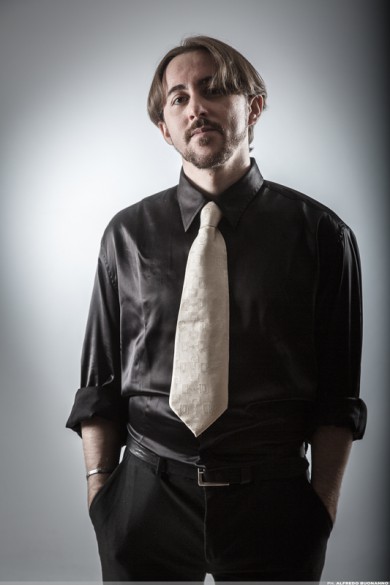Miami Piano Festival to have Italian flavor, leading off with Vincenzo Maltempo

Vincenzo Maltempo opens the Discovery Series of the Miami International Piano Festival with an all-Liszt program Thursday night.
Audiences at the Miami International Piano Festival first heard Vincenzo Maltempo in 2014. The Italian pianist shared the stage with vocalists in that year’s closing concert featuring opera excerpts and piano transcriptions. He will reprise that role in this year’s final festival concert May 15.
But on Thursday night Maltempo will have the stage of the Colony Theater all to himself, kicking off the festival’s five-concert Discovery Series with a program devoted solely to Liszt.
While the 30-year-old pianist has more than enough technique to handle Liszt’s fiendish digital fireworks, Maltempo also brings an elegant, singing line to the composer’s music, ideally suited to the composer’s gift for telling stories in music. The first half of Maltempo’s recital includes two such pieces (Vallee d’Obermann and the Dante Sonata) from Liszt’s multi-volume Annees de pelerinage (Years of Pilgrimage). His program also includes the familiar Valse-Impromptu, two Hungarian Rhapsodies, No. 10 and No. 2 (the latter with Maltempo’s own cadenza), as well as Polonaise melancolique and the Polonaise No. 2, with a coda by Ferrucio Busoni.
“It’s wonderful when I can tell a story when I play a piece,” Maltempo said in a recent interview from his home in Benevento, Italy, a town near Naples where he was born and still lives. “In the Dante Sonata I’m fascinated by the strong images of the [Divine] Comedy transposed into sound. This give you the opportunity to play with the sound and colors.”
Liszt is one of Maltempo’s specialties, and his first CD was an all-Liszt disc released in 2008 by Gramola. He recently recorded all of the composer’s Hungarian Rhapsodies for the Piano Classics label.
“Liszt was a very complex personality,” Maltempo adds, “eternally divided between hell and paradise, spirituality and the lure of the flesh, the flattery of fame. But he always goes beyond himself. I love his symphonic way of piano writing and his effort to exceed the limits of the instrument and of himself.”
Maltempo started playing the piano as a toddler. His parents gave him a small keyboard and he imitated the music he heard on radio and TV.
“I grew up with the music,” he said, “classical and mainly symphonic but also other kinds of great music: rock, progressive rock, jazz. To think in music and to make music to me is as natural as to breathe and to speak.”
He graduated with honors from Rome’s prestigious National Academy of St. Cecilia, won a competition sponsored by La Fenice theater in Venice and has performed throughout Europe. He also teaches in Italy and at an academy in the Netherlands.
Besides Liszt, Maltempo’s other great musical passion is Charles-Valentin Alkan, a 19th French pianist and composer now largely forgotten to all but a fervent band of devotees. Born in 1813, Alkan lived in Paris and was friends with Chopin and Liszt. In the 1830s and ‘40s his fame equaled theirs. But he periodically withdrew from public view, and when he died in 1883, he left few advocates to keep his music, virtually all of it written for piano, alive.
Alkan’s piano pieces are as technically demanding as any by Liszt or Chopin, but there’s a crisp bite to his lyricism that sounds surprisingly modern. Maltempo describes it as neo-classical though written decades before the term was even coined. Even so his bracingly virtuosic Alkan performances show no lack of fiery bravura.
“Alkan is the perfect contrast, and also an antidote, to Liszt’s music,” said Maltempo. “He is so refreshing, always new. He is rarely played because of the high difficulty of his major works, but he also composed pieces that are absolutely accessible.”
Though his major focus is the Romantic era, Maltempo’s repertoire stretches from the Baroque to the 20th century.
“Usually I feel tired if I have to play a composer for a long time,” he said. “It’s natural to me to go very deep into the world of the composer I am playing. So when I have to play Liszt for two months, usually I need [something like] Schubert after that. I cannot play music from the outside. I always go deep into their world, so it can be a little tiring.
“Also I am a personality that needs a lot of different kinds of music,” he said. “I am always drammatico with the moment, to find the words—temperamental, moody,” he clarified with a cheerful laugh. “One hour I need one kind of music, the next day I need another kind of music. I need to speak with the music, so I need a lot of different words.”
The Discovery Series of the Miami International Piano Festival opens with Vincenzo Maltempo Thursday, followed by Emanuel Rimoldi Friday and Luigi Carrocchia on Saturday. All concerts begin 7:45 p.m. at the Colony Theater in Miami Beach. miamipianofest.com
Posted in Articles
Leave a Comment
Mon May 9, 2016
at 8:00 pm
No Comments




